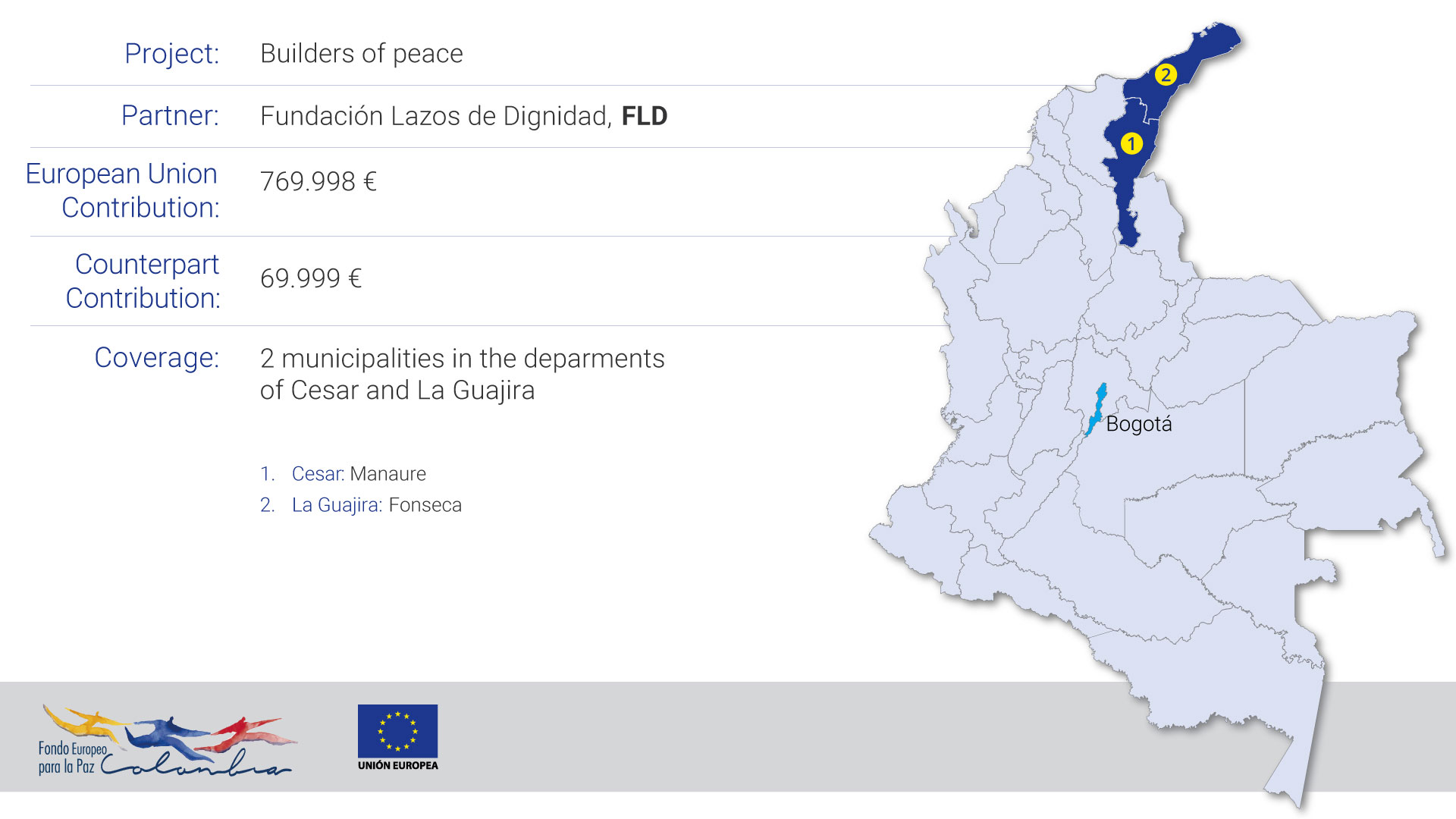

|
Builders of peace: A social and economic reincorporation strategy for reconciliation and strengthening of local development |
|
Contributing to the social and economic reincorporation of the ex-combatants, promoting reconciliation with the surrounding communities in Fonseca (La Guajira) and Manaure (Cesar) |
|
Implementation period
From 16/Jan/2019 To 30/Sep/2023 |
|
General Description
This strategy contributes to the social and economic reincorporation of ex-combatants in Fonseca and Manaure, promoting reconciliation within the community. The strategy is based on the development of economically-oriented projects in the construction sector with a comprehensive, differentiated, inclusive, and regional approach. This strategy is in line with the main social and economic reincorporation strategy in the Colombian Caribbean, focused on the construction and rehabilitation of homes and economic environments. The strategies are aimed at complementing and consolidating this reincorporation action, thus creating competencies and impact on regional reconciliation and local development. The strategy contributes to improving the conditions for the reincorporated population, strengthening the construction sector and employability in the border region. This strategy benefits the population of both ETCRs, their families, and the community through training programs that promote employment. Subsequently, the implementation of construction sector business units will benefit ex-combatants and the community, who will be employed and will obtain a source of income. |
|
Contribution to the Peace Accourds
The project contributes to point 1 of the Peace Agreement by addressing social and economic gaps in the regions most affected by the armed conflict by strengthening local development. Implementing training in communities, promoting environmentally sustainable work alternatives, and establishing partnerships in the region to create economic projects. In addition, the project aligns with point 3.2 of the Peace Agreement by supporting the social and economic reintegration of ex-combatants, promoting reconciliation with the surrounding community through the development of economic projects in the construction sector with a comprehensive and differentiated approach (gender, people with disabilities, and ethnic) inclusive, and regional. The method to achieve this focuses on collaborative work, cooperativism, and the solidarity economy, promoting coexistence and regional development as means of national reconciliation. |
|
Objectives and Results
To contribute to the social and economic reincorporation of ex-combatants and reconciliation with the communities, the project establishes the following specific objectives: ● Create job skills that promote the economic insertion of the reincorporated population, their families, and the surrounding community in the construction sector, favoring local development. ● Create and/or strengthen economic initiatives in the construction sector through collaborative work, cooperativism, and solidarity economy. ● Strengthen the social fabric by building physical and interaction spaces that favor reconciliation and coexistence between the local community and reincorporated population. |
|
|
||
|
€ 769.998 UE Support |
€ 69.999 Counterpart |
€ 839.998 Total |
| Featured Indicators |
| Indicator | Goal | Last Update | Advance | Current Value | Status |
|---|---|---|---|---|---|
| 01. 350 ex-combatants and their families have found economic strategies for their economic insertion | 350 | September 2023 | 40 % | 140 | Complete |
| 02. 30 people from nearby communities have obtained social and economic conditions to access the economic insertion | 30 | September 2023 | 100 % | 30 | Complete |
| 03. Three cooperatives, representing 90% of ex-combatant men and women, are consolidated and strengthened, and operate in solidarity economy and collaborative work schemes | 3 | September 2023 | 66 % | 2 | Complete |
| 04. Ten permanent spaces for dialogue, joint work and integration between ex-combatants, families, and nearby communities available for community integration and reconciliation | 10 | September 2023 | 130 % | 13 | Complete |
| 05. 200 men and women have been trained in sustainable construction and eco architecture | 200 | September 2023 | 133 % | 267 | Complete |
| 06. 200 women have acquired knowledge and skills necessary to undertake social / solidarity economy and sustainability initiatives that contribute to local development | 200 | September 2023 | 100 % | 200 | Complete |
| 07. 160 ex-combatants and 20 people from the surrounding communities have participated implementing the sector’s economic units | 180 | September 2023 | 77 % | 140 | Complete |
| 08. 200 men and women have received training in hardware skills, carpentry, brick production, locksmithing, and material transportation | 200 | September 2023 | 136 % | 272 | Complete |
| 09. 160 ex-combatants working and being employed in the area of hardware, carpentry, brick production, locksmithing, and material transportation | 160 | September 2023 | 35 % | 57 | Complete |
| 10. Four economic units of the construction sector operating permanently in the ETCR and communities | 4 | September 2023 | 250 % | 10 | Complete |
| 11. 70% the products are commercialized in the local market | 70 | September 2023 | 142 % | 100 | Complete |
| 12. Two community infrastructures built collectively for reconciliation, reparation, and local development and the well-being of the surrounding and reincorporated population | 2 | September 2023 | 350 % | 7 | Complete |
| 13. 90% of ex-combatants, their families, and communities use community infrastructure for social, cultural, and economic activities. | 90 | September 2023 | 111 % | 100 | Complete |
| Advocate | Partner | Local Partners and Co-Applicants |

Unión Europea |
Fundación Lazos de Dignidad |
Cooperativa Multiactiva para la paz de Colombia Cooperativa Multiactiva Tierra Grata |
Geographic Coverage
Project Resources Download project information in PDF |